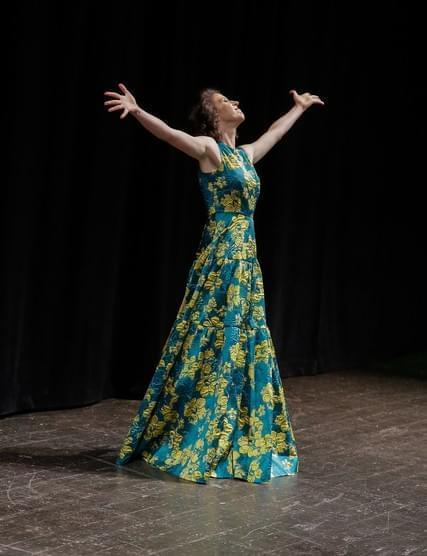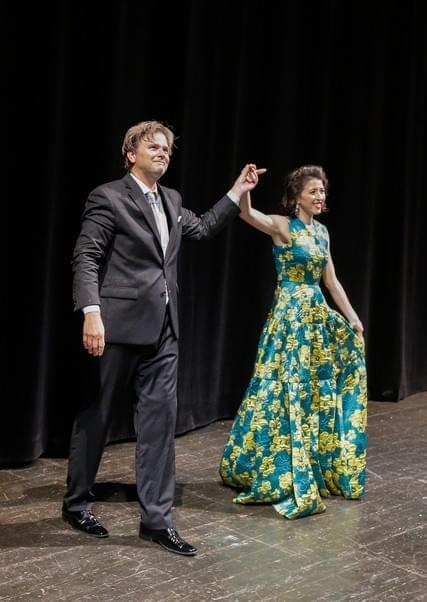Concert
About
August 14th, 4:00pm
Lisette Oropesa appears in a concert at the Teatro Rossini with the Filarmonica Gioachino Rossini, conducted by Christoper Franklin.
Program
W.A Mozart
"Idomoneo"
Ouverture
Padre, germani, addio
G. Verdi
"I Vespri sicilani"
Sinfonia
"I Masnadieri"
Tu del mio Carlo al seno
G. Meyerbeer
"Margherita d'Anjou"
Sinfonia Militare
"Robert le Diable"
Robert, toi que j'aime
G. Bizet
"Les Pëcheurs de perles"
Comme autrefois
C. Saint-Saëns
Vocalise
"Le rossignol et la rose"
G. Rossini
"Tancredi"
Sinfonia
Come dolce all'alma mia
"Il turco in Italia"
Squallida veste e bruna
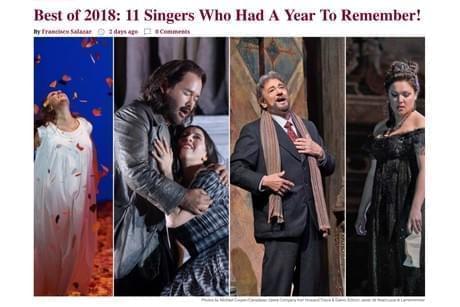
Opera Wire - 11 Singers who had a year to remember
OperaWire gives Lisette the #1 position on singers who had a year to remember for 2018!

Interview - Vanity Fair Italia
Interview with Lisette in Vanity Fair
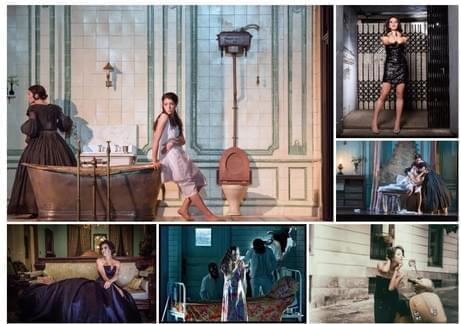
Interview - Connessi all'Opera
Lisette is interviewed in Connessi all'Opera

☀️ Summer Newsletter
Teatro Real, Rossini Festival, La Fenice, Aria di Verona
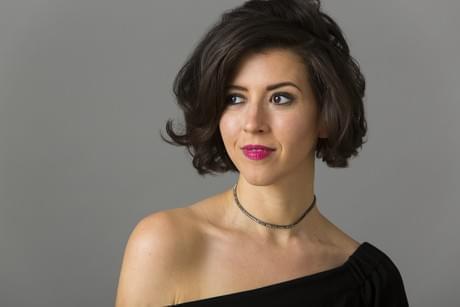
Rossini America - Interview
Lisette Oropesa interviewed with Rossini America
Reviews
Il trillo di Lisette
Sottile con il fisico da cui proviene sembra la voce di Lisette Oropesa, ma questo con questo filo l'artista sa tessere trine preziose, ricami e trasparenze, giocare in un'ampia gamma dinamica; scala caparbia le vette del pentagramma, e quando sembra che il suono possa essere un po' dritto e rischiare d'indurirsi, stupisce modulandolo con decisione. Così, ancora una volta non è un qualche arcano incanto timbrico o coloristico a colpire nell'astrazione del vocalizzo Le rossignol et la rose di Saint-Saëns, bensì, si direbbe, il suo contrario, un suono quasi prosciugato all'essenza e di lì condotto nelle volute della coloratura estetizzante del secondo Ottocento. Non trascendentale, affabile, piuttosto, fine, sciolta, duttile e sicura. Quando, poi, in chiusura di programma, torna al belcanto italiano con un omaggio a Rossini, la leggerezza fanciullesca si riarrotonda per offrire una piacevole, sognante Amenaide (“Come dolce all'alma mia”) e una Fiorilla (“Squallida veste e bruna”) debitamente ardita nei virtuosismi. Fra applausi calorosissimi, Juliette tornerà a dimostrare l'affinità del soprano con il repertorio francese e Violetta la sicurezza della preparazione anche in un cimento dei più insidiosi.Subtle and emanating from a lean physique, Lisette Oropesa's voice might seem, yet with this thread the artist knows how to weave precious laces, embroideries, and transparencies, playing within a wide dynamic range; she stubbornly climbs the peaks of the stave, and when it seems that the sound might be a bit stiff and risk hardening, she surprises by modulating it decisively. Thus, once again, it is not some arcane enchantment of timbre or coloration that strikes in the abstract vocalism of Saint-Saëns's Le rossignol et la rose, but rather, one might say, its opposite, a sound almost drained to the essence and from there conducted into the scrolls of the aestheticizing coloratura of the late nineteenth century. Not transcendental, but affable, rather, refined, fluid, flexible, and secure. Then, when closing the program, she returns to Italian bel canto with a tribute to Rossini, the youthful lightness gets rounded off to offer a pleasant, dreamy Amenaide ("Come dolce all'alma mia") and a Fiorilla ("Squallida veste e bruna") properly daring in virtuosity. Amid very warm applause, Juliette will return to demonstrate the soprano's affinity with the French repertoire and Violetta the security of her preparation even in one of the most treacherous challenges.— Roberta Pedrotti • L'ape musicale
Rof, il concerto di Lisette Oropesa incanta il pubblico
PESARO – Meditativa prima, poi appassionata, frizzante, esuberante, scatenata, travolgente, incontenibile. Lisette Oropesa, soprano statunitense nata a New Orleans, in Luisiana, dove si respira cultura europea, soprattutto francese, è stata protagonista di uno dei concerti più memorabili nella storia del Rossini Opera Festival, che pure nei suoi 39 anni di momenti indimenticabili ne ha vissuti un’infinità. Mancava un concerto come quello della protagonista di Adina che non ha tradito le grandi attese.PESARO – Meditative at first, then passionate, lively, exuberant, unleashed, overwhelming, irrepressible. Lisette Oropesa, an American soprano born in New Orleans, Louisiana, where there's a strong European culture, especially French, was the star of one of the most memorable concerts in the history of the Rossini Opera Festival, which, in its 39 years of unforgettable moments, has experienced a multitude. There hadn’t been a concert like that of the protagonist of Adina, which did not betray the great expectations.— Luciano Murgia • pu24.it
Pesaro, Rossini Opera Festival 2018 – Lisette Oropesa in concerto
La franchezza e la freschezza del materiale, la superiore capacità di emozionare e l’ottimo dominio tecnico vanno al di là – o forse al di qua – della lezione callassiana: ricordano la bellezza di una Moffo come l’empito rigoglioso della miglior Caballé. O, forse, semplicemente di Lisette Oropesa: che a Pesaro si inscrive nel firmamento delle certezze del repertorio lirico e serenamente vi brilla all’ombra dell’“astro maggior” di Gioachino Rossini.The frankness and freshness of the material, the superior capacity to move emotionally, and the excellent technical mastery go beyond – or perhaps precede – the lessons of Callas: they recall the beauty of a Moffo as well as the vigorous impulse of the best Caballé. Or, maybe, simply of Lisette Oropesa: who in Pesaro joins the firmament of certainties in the operatic repertoire and serenely shines there under the "greater star" of Gioachino Rossini.— Giuseppe Montemagno • Conessi all'Opera
Pesaro - Teatro Rossini: Concerto di Lisette Oropesa e Christopher Franklin
Qui la Oropesa (che debutterà nel ruolo di Isabelle nella prossima stagione a Bruxelles) metteva in mostra tutto il suo migliore armamentario: purezza del legato, espressività contenuta eppure di grande impatto, sicurezza assoluta dell’emissione con pianissimi eterei in zona acuta, trillo da belcantista provetta e variazioni ardite mutuate dalla Sills del disco di arie francesi di fine anni sessanta, ricevendo un tripudio di applausi.Here, Oropesa (who will debut in the role of Isabelle next season in Brussels) showcased all her finest arsenal: purity of legato, contained expressiveness yet of great impact, absolute certainty of emission with ethereal pianissimos in sharp zones, trills of a skilled bel canto singer and daring variations borrowed from Sills' album of French arias from the late sixties, receiving a triumphant applause.— Silvano Capecchi • Opera Click


